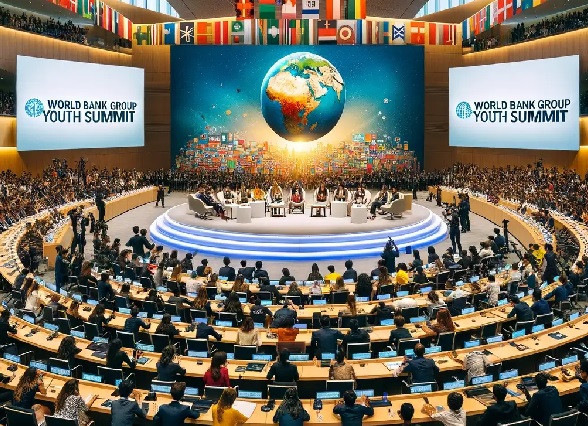Popular Reads
Top Results
Can't find what you're looking for?
View all search resultsPopular Reads
Top Results
Can't find what you're looking for?
View all search resultsChampioning inclusion: Lessons from the World Bank Group Youth Summit 2024
Those who are late to adopt and lack access to AI technology risk falling further behind, therefore prioritizing access and education matters.
Change text size
Gift Premium Articles
to Anyone
A
s I reflect on my experience at the 11th edition of the World Bank Group Youth Summit in Washington, DC, I am filled with a sense of gratitude and accomplishment.
The event, held at the World Bank Group headquarters, is the largest annual gathering of youth (aged 18-35) hosted by the group, attracting thousands of participants from various regions. This year's summit focused on digital inclusion, artificial intelligence and sustainable technology.
The selection process for the summit was highly competitive, with more than 4,000 applicants worldwide and only 250-300 of them, including me, chosen for in-person participation.
During the summit, I had the opportunity to speak about the rapid development of AI, drawing on insights from former Google CEO Eric Schmidt, who envisioned AI transforming the world and enhancing output even for the most skilled workers.
However, there is the potential for AI to widen disparities between developed and developing countries. Those who are late to adopt and lack access to AI technology risk falling further behind. Therefore, there is the necessity to prioritize access and education, bringing digital tools and skills to every corner of the world. Collaboration and cooperation between governments, the private sector, society and international organizations are essential to achieving this goal.
A key highlight of the Youth Summit was the case competition. The case, developed by Deloitte, focused on bridging the digital divide in a fictional country called Digitalia in the South Asia region. Our challenge was to create a strategic road map for Digitalia to increase digital literacy and skills for youth, especially women, boost the creation of digital jobs and enhance participation in the digital economy.
I led a diverse team of six delegates from Indonesia, Taiwan, the Central African Republic, Afghanistan and India.
As the case focused on the South Asia region, I interviewed other delegates from South Asia to understand their societal dynamics and everyday life.
I learned from the interview that many women in South Asia are not allowed to work due to patriarchal norms. However, many women operate home industries, producing food or crafts and selling them to their neighbors.
This insight led me to propose creating specialized IT curriculums. Specifically for these women, learning how to market their products online, set up an online store and sell them could offer tremendous opportunities to leverage technology to generate income for their families. This could also help challenge the stigma that women cannot work by demonstrating their contributions.
The case competition was meticulously designed to simulate the real-life conditions of working as a policy consultant. This experience was challenging yet incredibly educational. Listening to ideas from teammates of diverse backgrounds and cultures brought fresh perspectives.
During our team discussions, a teammate from Taiwan suggested providing daycare services for women participating in our IT training programs, enabling them to attend without feeling guilty about leaving their families for a few hours. This idea, often overlooked, highlights the importance of diverse perspectives, as diversity fosters creativity and innovation.
Our team won the regional stage of the competition. The panel of jury, comprising representatives of Deloitte and the United Nations, appreciated our commitment to inclusivity, ensuring that our policy road map took into consideration every stakeholder.
The World Bank Group Youth Summit 2024 has been an enriching and transformative experience. Like other participants, I am eager to apply this knowledge in policy formulation. Designing effective policies requires considering all stakeholders involved, regardless of their size or influence.
Policies must be inclusive, ensuring that no one is left behind. Technology should be leveraged to create a more equitable world.
The summit showed that youth, especially those in the Global South, should have the courage to articulate ideas and initiatives. Youth across the world have the power to make significant contributions. By stepping up and voicing our visions, we can drive positive change and create a more inclusive and equitable world for all.
***
The writer is personal assistant to the presidential advisor for economics and energy. He would like to thank presidential advisor for economics and energy, Gandi Sulistiyanto, Lentera Mata Indah Foundation chairman Robert Njo and the Indonesian Embassy in Washington, DC, for their support during his trip.











